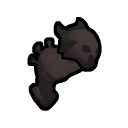Sightstealer
| This article relates to content added by Anomaly (DLC). Please note that it will not be present without the DLC enabled. |
| Spoiler warning: This page may contain details about the gameplay that might be considered spoilers. If you wish to enjoy the content first hand, you probably shouldn't continue reading beyond this point. |
| This article is a stub. You can help RimWorld Wiki by expanding it. Reason: General. |
Sightstealer
Emaciated and misshapen humanoids. Their arms end in sharp, curled claws formed from bioferrite. Sightstealers are fragile, but use psychic influence to render themselves invisible until they get close to their victims. They are known to emit haunting screams as they gather on their terrible hunts.
Base Stats
Pawn Stats
- Combat Power
- 70
- Move Speed
- 4.83 c/s
- Health Scale
- 75% HP
- Body Size
- 0.8
- Mass
- 48 kg
- Filth Rate
- 1
- Diet
- none
- Life Expectancy
- 250 years
- Trainable Intelligence
- None
- Psychic Sensitivity
- 200%
- Toxic Resistance
- 50%
Production
- Meat Yield
 70 Twisted meat
70 Twisted meat- Leather Yield
 20 dread leather
20 dread leather
Melee Combat
- Attack 1
- Left claw (Claw)
7.0 dmg (Scratch)
10 % AP
2 second cooldown - Attack 2
- Right claw (Claw)
7.0 dmg (Scratch)
10 % AP
2 second cooldown - Attack 3
- Head
3 dmg (Blunt)
4 % AP
2 second cooldown
0.1 chance factor - Average DPS
- 2.17
Containment
- Min Containment Strength
- 30
- Knowledge Gain
- 1.5 Basic
- Study Interval
- 120,000 ticks (2 in-game days)
- Min Monolith Level For Study
- 1
- Held on Spot or Platform
- true
- Escape Interval
- MTB 60 days
The sightstealer is an entity added by the Anomaly DLC. It is likely to be one of the first anomalous entities a colony will encounter.
Acquisition
The Sightstealer will randomly wander onto the map in an invisible state. In this state, it can pass directly through a tamed animal without being detected. It will reveal itself when it either gets close to a colonist or an invisibility disruptor, such as a disruptor flare forcing it out of this state. Once it's out of this state it can be engaged in standard combat.
Summary
Relatively weak entities that feel pain, bleed, and are susceptible to disease. Sightstealers will trigger proximity detectors when in range. However, the proximity detector will not reveal it. They can also walk through traps without triggering them.
Sightstealers can occasionally howl when downed or killed. These howls will attract a pack of sightstealers (essentially a sightstealer raid) to attack the colony; their arrival time ranges from a few hours to a few days. The pack will approach the colony and become visible when moving to attack a pawn or active, friendly mechanoid![]() . 1-2 Shards can be acquired from destroying the pack.
. 1-2 Shards can be acquired from destroying the pack.
Sightstealers also do not trigger traps regardless of their current visibility.
Yield
Contained Sightstealers yield 1.6 bioferrite per day when attached to a Bioferrite harvester.
Containment
The Sightstealer is fairly weak, requiring only 30 containment strength. This means you can use wooden walls and a basic holding spot to contain it with minimal risk.
Analysis
A single Sightstealer is unlikely to be a threat to even a group of brand new colonists. A large group ambushing a poor combatant could potentially be a problem, but only if a child wanders off alone or something equally irresponsible happens. They are marginally more dangerous than an unarmed baseliner, with claws that can cause bleeding.
A Sightstealer is one of the easiest anomalies to capture and contain that could be technically considered dangerous. Effectively a blessing to most colonies, providing an easy source of beginning research. Their weakness and stealth give them practically no defensive application.
Sightstealers are extremely vulnerable to fire. A pawn armed with an incendiary launcher, molotov cocktails, or incinerator can easily cripple even a pack of sightstealers. If the colony contains a mechanitor![]() , scythers, scorchers, tesserons, and centipede burners are effective counters. If a sightstealer howls, drafted mechanoids are valid targets for the sightstealers, and they will reveal themselves to attack. This can be used to force sightstealers to become visible before they draw close to colonists.
, scythers, scorchers, tesserons, and centipede burners are effective counters. If a sightstealer howls, drafted mechanoids are valid targets for the sightstealers, and they will reveal themselves to attack. This can be used to force sightstealers to become visible before they draw close to colonists.
Version history
- Anomaly DLC Release - Added.
